NRM doctoral candidate confirms recolonization of beavers in Lubbock
By: George Watson
 On his own time, on his own dime, completely unrelated to his dissertation and many
times in the dead of night, Texas Tech Department of Natural Resources Management
doctoral candidate Garret D. Langlois treks through the wooded area and cattails along the waters on the southwest side
of Mae Simmons Park in East Lubbock.
On his own time, on his own dime, completely unrelated to his dissertation and many
times in the dead of night, Texas Tech Department of Natural Resources Management
doctoral candidate Garret D. Langlois treks through the wooded area and cattails along the waters on the southwest side
of Mae Simmons Park in East Lubbock.
 He's not there clearing his head or spending time alone with his thoughts. No, there
is a purpose to Langlois' passion, and it has led to a discovery that not many in
Lubbock or the South Plains would have considered possible. There, among the cattails,
lies the proof: a worn swimming path near the bank where the water creature turns
around and goes back into hiding.
He's not there clearing his head or spending time alone with his thoughts. No, there
is a purpose to Langlois' passion, and it has led to a discovery that not many in
Lubbock or the South Plains would have considered possible. There, among the cattails,
lies the proof: a worn swimming path near the bank where the water creature turns
around and goes back into hiding.
Deep in the woods is evidence the creature has constructed nesting areas and dug tunnels to remain hidden. Near the tunnels, spiky stumps erupt from the ground – the remains of small trees that were cut by large incisors. Yes, the evidence is clear. There are beavers living in Lubbock's Canyon Lakes.
Through pictures and video taken by night-vision trail cameras, Langlois has confirmed the presence of a species that has been absent from this area of the United States for more than 5,000 years.
Langlois hypothesizes that the North American Beavers previously believed to not occur on the Brazos River west of Knox County have been colonizing upstream for well over a decade, eventually arriving in the Canyon Lakes during the uncommonly heavy summer rains of 2015. In early May of that year, flooding rains fell on Lubbock and the South Plains, and particularly along the North Fork of the Double Mountain Fork of the Brazos River, which connects to Dunbar Historical Lake running through Mae Simmons Park.
But it wasn't until a beaver carcass was found in November of that year that Langlois' curiosity on the subject kicked into high gear. In what spare time he had around his doctoral dissertation work and other academic responsibilities, Langlois spent his weekends searching for live beavers along the shores of Canyon Lake 6 in Mae Simmons Park.
 After months of searching, in January of 2018, Langlois discovered stumps of trees
that appeared to have been chewed roughly 1-3 years past. Other signs began to appear,
such as cattails that had been mashed down in places where the beavers haul themselves
out onto land. A search through the heavily wooded area along the southern shore of
Canyon Lake 6 in late March of 2018 turned up a nesting spot where a beaver had tunneled
through and water from the lake had risen to the surface, and another spot indicated
the presence of a beaver den and further partially collapsed tunnel openings, all
signs pointing to the presence of the beaver.
After months of searching, in January of 2018, Langlois discovered stumps of trees
that appeared to have been chewed roughly 1-3 years past. Other signs began to appear,
such as cattails that had been mashed down in places where the beavers haul themselves
out onto land. A search through the heavily wooded area along the southern shore of
Canyon Lake 6 in late March of 2018 turned up a nesting spot where a beaver had tunneled
through and water from the lake had risen to the surface, and another spot indicated
the presence of a beaver den and further partially collapsed tunnel openings, all
signs pointing to the presence of the beaver.
 But beavers are nocturnal, so it was highly unlikely there were ever going to be any
daytime sightings of the creatures. So, Langlois borrowed three motion-activated trail
cameras from Gipson and deployed them on trees along the water near where the den
was discovered. Finally, after almost four months of checking the trail cameras, on
July 8, 2018, Langlois' hypothesis became reality. There, on the trail cameras, were
a pair of North American Beavers swimming through the waters of Canyon Lake 6. Langlois
had his confirmation.
But beavers are nocturnal, so it was highly unlikely there were ever going to be any
daytime sightings of the creatures. So, Langlois borrowed three motion-activated trail
cameras from Gipson and deployed them on trees along the water near where the den
was discovered. Finally, after almost four months of checking the trail cameras, on
July 8, 2018, Langlois' hypothesis became reality. There, on the trail cameras, were
a pair of North American Beavers swimming through the waters of Canyon Lake 6. Langlois
had his confirmation.
Langlois put all his findings into a paper currently in peer review for publication, providing definitive proof that the North American Beaver has returned to the South Plains and is making its base right here in Lubbock. The question now becomes – what next?
All involved in the project agree that having beavers in the Canyon Lakes is good not only for the species, but for the city as well. The wooded area provides terrific protection from predators, and even the Black-crowned Night-Herons that roost there provide an early warning alarm system for the beavers if any predators or humans come into the area.
“It's good news if we can be accepting of them,” Langlois said.
CONTACT: Richard Stevens, President's Excellence in Research Professor and Professor of Natural Resources Management, Department of Natural Resources Management, Texas Tech University at (806) 834- 6843 or richard.stevens@ttu.edu
1105NM21 / Editor’s Note: A video produced by TTU Marketing & Communications featuring Garret D. Langlois’ research can be viewed here
Davis College NewsCenter
-
Address
P.O. Box 42123, Lubbock, Texas 79409-2123, Dean's Office Location:Goddard Building, Room 108 -
Phone
(806)742-2808 -
Email
kris.allen@ttu.edu
